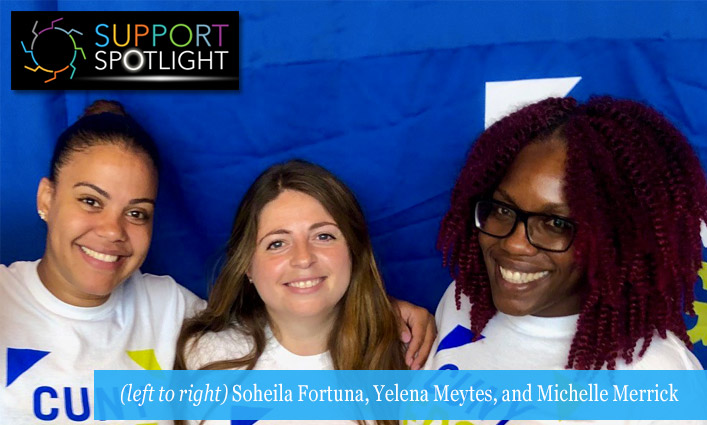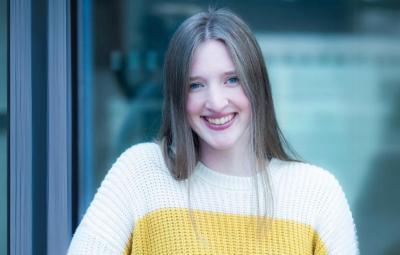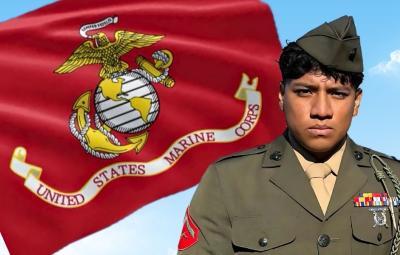
The CUNY EDGE (Educate, Develop, Graduate, and Empower) program at John Jay is uniquely positioned to uplift students facing some of life’s most difficult challenges. The program, funded and operated in partnership between CUNY and the New York City Human Resources Administration (HRA), provides students living on public assistance and below the poverty line with the support and resources needed to achieve academic excellence, graduate on time, and find employment. There are 19 colleges across the CUNY system that have CUNY EDGE. At John Jay, the team behind the program, Yelena Meytes, Program Director, Soheila Fortuna, Assistant Director, and Michelle Merrick ’20, Fellowship Coordinator, go the extra mile to ensure their students overcome challenges and meet their personal, academic, and professional goals. “At CUNY EDGE, what drives us and keeps us motivated are our students. We’re passionate about helping every single one of our students succeed, no matter their circumstances,” says Meytes.
“At CUNY EDGE, what drives us and keeps us motivated are our students. We’re passionate about helping every single one of our students succeed, no matter their circumstances.” —Yelena Meytes, Program Director
For Merrick, who’s also a John Jay and CUNY EDGE alumna, the work the team is doing is invaluable and she knows it’s effective. “I’m a product of the CUNY EDGE program at John Jay. When I started at the College, I was on welfare, a mother of three, and my son was only a month old. It was because of the help and guidance I got through CUNY EDGE that I was able to make it onto the Dean’s List every semester, I got the chance to study abroad, and I was able to graduate. The CUNY EDGE team helped me see my potential,” recalls Merrick. “It wasn’t easy. There were hard, rough days. But because Yelena and Soheila believed in me, I believed in me, and it’s why I’m here.” We spoke with the CUNY EDGE team to learn more about the program and its incredible impact on students.
Tell us about the CUNY EDGE program. What makes it unique?
Meytes: In order to get our services, students have to be matriculated CUNY students who are HRA public assistance recipients. We work with students who are dealing with a lot of difficult challenges. Our students live below the poverty line and receive public assistance to help them with their daily living needs. As CUNY EDGE students, they’re showing that they want to get an education and find employment. Their engagements on campus have to be proven, so we fill out a lot of specialized documents to submit to HRA. Our team, the three of us, wear many hats because our goal is to be a one-stop-shop for our students. Not only are we the liaisons to HRA, but we’re also trained in academic advisement, career development, and in case management. So, we’re helping students by providing individualized academic, personal, and professional development support. We each have a roster of students, and we’re connecting them to the right resources and making sure they’re successful.
Merrick: Trust is also at the core of our CUNY EDGE program. Relationship building with our students is so important to us. We want to make them feel comfortable. We want to build that trust with them. We have an open-door policy. Our office is a safe space, and whatever our students discuss with us, stays between us. We’re here for them and understand what they’re going through.
“Our office is a safe space, and whatever our students discuss with us, stays between us.” —Michelle Merrick, Fellowship Coordinator
When a student first enters the CUNY EDGE program at John Jay, what does that process typically look like?
Meytes: When we first meet our students during the onboarding process, we do an intake with the goal of understanding what’s going on in their home environment and where they’re coming from academically. Then we assess what their goals are and where they need to be for their career trajectory. We customize programming toward their needs, we use a database to track their workload and progress, and we touch base with them constantly to make sure they’re on track to meet their goals.
Individualized advisement is a key aspect of CUNY EDGE, in what ways has it helped students throughout their John Jay journey?
Fortuna: Everyone needs a mentor and basically, we’re our students’ mentors from the moment they walk into our program. We’re guiding them throughout their John Jay experience and preparing them for what will happen once they graduate. One of the challenges our students face is all the paperwork they have to fill out. We sit down with them and walk them through it, answering their questions.
“Everyone needs a mentor and basically, we’re our students’ mentors from the moment they walk into our program.” — Soheila Fortuna, Assistant Director
During our individualized advisement sessions, we’re finding out their strengths, the areas they need to build up, and what they’re hoping to pursue after John Jay. We’re also helping them navigate the challenges that come their way, whether it’s an academic, personal, or job issue. The one-to-one advisement really helps students think outside the box and step outside their comfort zones. They learn to advocate for themselves, their confidence is boosted, and they find the power in their voice throughout the process. Every semester, we assess how they’re doing, at the start and end of the semester. That consistent assessment and reflection period empowers them because they’re able to see their growth.
“The one-to-one advisement really helps students think outside the box and step outside their comfort zones.” —Soheila Fortuna, Assistant Director
Community building plays a big role in CUNY EDGE’s strategy toward student success. Can you tell us a bit about that?
Fortuna: It’s all about promoting a sense of community on campus for our students. A lot of times, they’re siloed in what’s going on in their lives and the difficult things they’re going through, so, we’re always trying to make sure they have clear and attainable access to us and other offices at John Jay. We’re housed in the Center for Career Services and Professional Development, so Chantelle Wright and her team are huge supporters of our program. We’ve also made connections with different departments such as Jay Express, the Registrar’s Office, Academic Affairs, and the Wellness Center. When we’re on campus, what I like to do is walk the student to the office and make the connection myself with the person there, this way the student sees the connection happening and feels secure in the process. Now that we’re remote, the connections are still happening, just in a different way. We’re currently connecting with students via Blackboard, email, and even using a text messaging service. When connecting students with a department or office, we make the connection via phone calls, emails, and Zoom sessions.
What kind of workshops does CUNY EDGE host and how do they help students?
Meytes: A lot of our workshops are career-based, providing insight on different professions and focusing on job search, resume, and cover letters. Those workshops are in collaboration with the Career Center and help our students, especially those in the CUNY EDGE Fellowship Program. We also have time management workshops, where we go through the student’s syllabus, provide tips, techniques, and advice on time management, and we offer financial literacy workshops, where we break down how a savings account works. Since our students are on public assistance, they’re wary of savings accounts and how it can affect their benefits. Our workshop helps them transition from being on public assistance to feeling safe and comfortable enough to open up a bank account.
“No one should look down on you because you’re on public assistance or a CUNY EDGE student. At the end of the day, you’re showing up. You’re here at John Jay, getting your education, working toward earning your degree, and securing a career so you can better your life and your family’s life. That’s something to be proud of.” —Michelle Merrick, Fellowship Coordinator
Are there any misconceptions you’d like to dispel about CUNY EDGE?
Meytes: Students in the program don’t want others to know they’re in CUNY EDGE, because then their peers will know they’re on welfare or another type of public assistance—so there’s a stigma. We’re working to de-stigmatize the program because it’s not something to be ashamed of. Our students are deeply committed to excelling academically and professionally, just like their peers. They’re incredibly smart, determined, and capable.
Merrick: I try to encourage students by telling them my story as a CUNY EDGE alumna. You might have started this John Jay journey in a position where you aren’t as financially as well off as others, and have to go through the system to get a little help, but that’s okay. No one should look down on you because you’re on public assistance or a CUNY EDGE student. At the end of the day, you’re showing up. You’re here at John Jay, getting your education, working toward earning your degree, and securing a career so that you can better your life and your family’s life. That’s something to be proud of.



